英语介绍青海特色
关于青海风俗习惯的英语作文
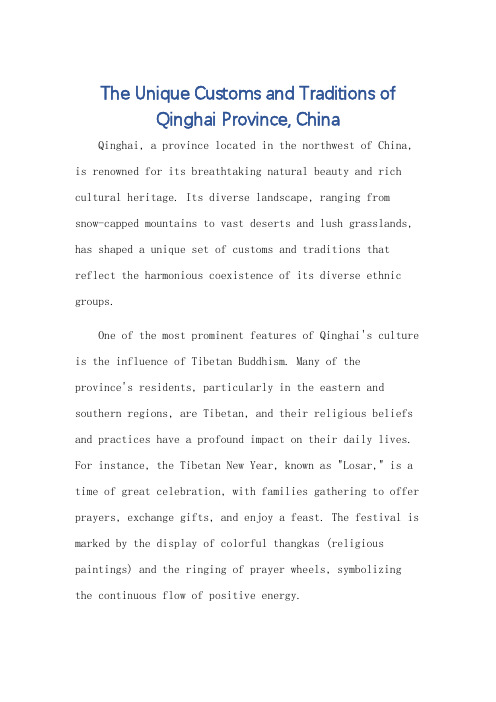
The Unique Customs and Traditions ofQinghai Province, ChinaQinghai, a province located in the northwest of China, is renowned for its breathtaking natural beauty and rich cultural heritage. Its diverse landscape, ranging from snow-capped mountains to vast deserts and lush grasslands, has shaped a unique set of customs and traditions that reflect the harmonious coexistence of its diverse ethnic groups.One of the most prominent features of Qinghai's culture is the influence of Tibetan Buddhism. Many of theprovince's residents, particularly in the eastern and southern regions, are Tibetan, and their religious beliefs and practices have a profound impact on their daily lives. For instance, the Tibetan New Year, known as "Losar," is a time of great celebration, with families gathering to offer prayers, exchange gifts, and enjoy a feast. The festival is marked by the display of colorful thangkas (religious paintings) and the ringing of prayer wheels, symbolizing the continuous flow of positive energy.Another significant aspect of Qinghai's culture is its rich folk art and music. The province is famous for its traditional dances, such as the "Guo Zhuang Dance" and the "Long Dance," which are often performed during festivalsand special occasions. These dances, often accompanied by the sound of drums and horns, are a vibrant display of the province's cultural vitality. Similarly, Qinghai's folk music, particularly the "Hua'er" and "Ganmei" genres, is renowned for its melodious tunes and profound lyrics, reflecting the deep emotional connections of its people to their land and heritage.The food culture of Qinghai is also noteworthy. The province's cuisine, influenced by its diverse ethnic groups, is a delicious blend of flavors and textures. Dishes suchas "Yak Meat Stew" and "Lamb Kebabs" are popular throughout the province, reflecting the province's rich pastoral heritage. Additionally, Qinghai's unique geographical location has given rise to delicious local delicacies such as "青海湖鱼" (Fish from Qinghai Lake), a prized delicacy due to the lake's pure waters.Qinghai's festivals and ceremonies are also rich in tradition and meaning. The "Sacrificial Offering to the Mountain God" is a prime example, a ceremony aimed at praying for the well-being of the community and thankingthe gods for their bounty. Similarly, the "Tea Ceremony" is an essential aspect of Tibetan culture, serving as a social gathering and a time to appreciate the virtues of tea andits place in Buddhist practice.The people of Qinghai also have unique beliefs and customs related to nature and the environment. For instance, they revere certain mountains, lakes, and trees as sacred, believing that these natural elements possess divine powers that protect and bless them. This respect for nature is reflected in their daily lives, with many communities practicing sustainable living practices that harmoniously coexist with their environment.In conclusion, Qinghai's unique customs and traditions are a testament to the rich cultural heritage and diverse ethnic groups that have shaped the province's identity. From the vibrant displays of folk art and music to the delicious cuisine and sacred festivals, each aspect ofQinghai's culture reflects the deep-rooted values and beliefs of its people. As the province continues to evolve and develop, it is these customs and traditions that will continue to define and enrich its cultural landscape.。
青海的介绍英文作文

青海的介绍英文作文英文:I would like to introduce Qinghai, a province locatedin the northwest of China. Qinghai is known for itsstunning natural scenery, including the Qinghai Lake, which is the largest saltwater lake in China. The lake is surrounded by snow-capped mountains and grasslands, makingit a popular destination for tourists.In addition to its natural beauty, Qinghai is also home to a diverse range of ethnic groups, including the Tibetan, Hui, and Tu people. Each group has its own unique culture and traditions, which can be seen in their clothing, food, and festivals.One of the most famous festivals in Qinghai is the Tibetan New Year, also known as Losar. During this festival, people gather to eat traditional Tibetan food, dance, and participate in religious ceremonies. It is a time forfamilies to come together and celebrate the start of a new year.Another unique aspect of Qinghai is its wildlife. The province is home to a variety of rare and endangered species, such as the Tibetan antelope and the snow leopard. There are also many bird species that can be spotted in Qinghai, making it a popular destination for birdwatchers.Overall, Qinghai is a province that offers a unique blend of natural beauty, cultural diversity, and wildlife.It is a place that I highly recommend visiting if you have the opportunity.中文:我想介绍一下青海,这是中国西北部的一个省份。
关于青海风俗习惯的英语作文
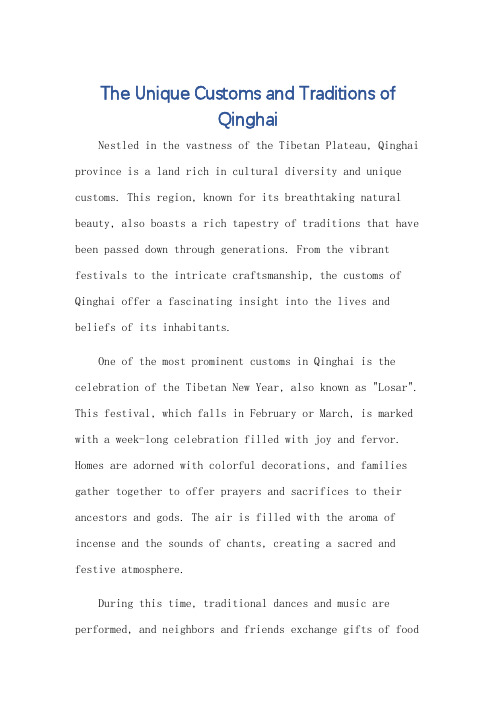
The Unique Customs and Traditions ofQinghaiNestled in the vastness of the Tibetan Plateau, Qinghai province is a land rich in cultural diversity and unique customs. This region, known for its breathtaking natural beauty, also boasts a rich tapestry of traditions that have been passed down through generations. From the vibrant festivals to the intricate craftsmanship, the customs of Qinghai offer a fascinating insight into the lives and beliefs of its inhabitants.One of the most prominent customs in Qinghai is the celebration of the Tibetan New Year, also known as "Losar". This festival, which falls in February or March, is marked with a week-long celebration filled with joy and fervor. Homes are adorned with colorful decorations, and families gather together to offer prayers and sacrifices to their ancestors and gods. The air is filled with the aroma of incense and the sounds of chants, creating a sacred and festive atmosphere.During this time, traditional dances and music are performed, and neighbors and friends exchange gifts of foodand drinks. A special dish called "Tsemo" is prepared, which consists of barley flour mixed with butter, sugar, and other ingredients. This sweet treat is offered as a symbol of goodwill and blessings.Another noteworthy custom is the horse racing festival, known as the "Nadam Festival". This festival, which is held in July or August, is a grand celebration of horse racing, wrestling, and archery competitions. Riders from various regions converge to compete in a激烈的马术比赛, displaying their skills and prowess. The winner of the horse race is considered a great hero and is highly respected in the community.The art of carpet weaving is also a renowned custom in Qinghai. This intricate craft, passed down through generations, is a testament to the skill and dedication of the weavers. Using wool, cotton, and silk threads, they create beautiful patterns and designs that are bothvisually appealing and functionally useful. These carpets are often used as a form of decoration and are also exported to other parts of the country and abroad.The cuisine of Qinghai is also rich in cultural flavors. Dishes such as mutton stew, yak butter tea, and highland barley wine are staples of the local diet. These dishes are not only delicious but also reflect the unique environment and lifestyle of the people of Qinghai.In conclusion, the customs and traditions of Qinghaiare a vibrant and diverse expression of its rich cultural heritage. From the festive celebrations to the skilled craftsmanship, these customs serve as a bridge connecting the past with the present, and they continue to be passed down through generations, ensuring the preservation of this unique cultural identity.**青海独特的风俗习惯**坐落在藏高原的怀抱中,青海省是一个文化多元且富有独特风俗的地方。
介绍青海特色的作文英语

介绍青海特色的作文英语Title: Exploring the Unique Charms of Qinghai。
Nestled in the heart of China, Qinghai province stands out as a treasure trove of natural beauty and cultural richness. From its vast plateaus to its serene lakes, Qinghai offers a unique blend of landscapes and traditions that captivate the senses and inspire wonder. In this essay, we will delve into the distinctive features that make Qinghai a standout destination.First and foremost, Qinghai is renowned for its breathtaking scenery, dominated by the majestic Qinghai-Tibet Plateau. This high-altitude region boasts sweeping grasslands, snow-capped mountains, and pristine lakes, painting a picture-perfect panorama that leaves visitors in awe. One of the most iconic landmarks of Qinghai is the stunning Qinghai Lake, the largest saltwater lake in China, shimmering like a sapphire jewel against the backdrop of azure skies and rolling hills.Moreover, Qinghai is a melting pot of diverse cultures and ethnicities, with a rich tapestry of traditions woven into its fabric. The province is home to various ethnic groups, including the Tibetan, Hui, Mongolian, and Tu peoples, each contributing their unique customs, arts, and cuisines to the vibrant mosaic of Qinghai's cultural heritage. Visitors can immerse themselves in the colorful festivals, intricate handicrafts, and delectable dishesthat reflect the rich tapestry of Qinghai's cultural landscape.Furthermore, Qinghai boasts a wealth of historical and religious landmarks that bear testament to its storied past. From ancient Buddhist monasteries to sacred Taoist temples, Qinghai's architectural marvels offer a glimpse into the spiritual and philosophical beliefs that have shaped the region over the centuries. The Ta'er Monastery, also known as Kumbum Monastery, is a prime example of Qinghai's religious heritage, with its ornate pagodas, intricate murals, and tranquil courtyards drawing pilgrims andtourists alike.In addition to its natural beauty and cultural heritage, Qinghai is also a haven for outdoor enthusiasts and adventure seekers. The province offers a plethora of recreational activities, including trekking through rugged mountains, camping beneath star-studded skies, and horseback riding across vast grasslands. Whether it's exploring the otherworldly landscapes of the Qaidam Basinor rafting down the roaring rapids of the Yellow River, Qinghai provides endless opportunities for unforgettable adventures.Moreover, Qinghai's commitment to environmental conservation and sustainable development sets it apart as a model for responsible tourism. The province is home to several nature reserves and protected areas, aimed at preserving its delicate ecosystems and endangered species. Initiatives such as eco-friendly tourism practices, renewable energy projects, and wildlife conservationefforts underscore Qinghai's dedication to preserving its natural treasures for future generations to enjoy.In conclusion, Qinghai stands as a testament to the beauty of nature and the resilience of human culture. With its awe-inspiring landscapes, rich cultural heritage, and spirit of adventure, Qinghai offers a journey of discovery like no other. Whether exploring its pristine wilderness or immersing oneself in its vibrant traditions, Qinghai never fails to leave a lasting impression on all who visit its enchanting realms.。
英语作文青海的特产介绍
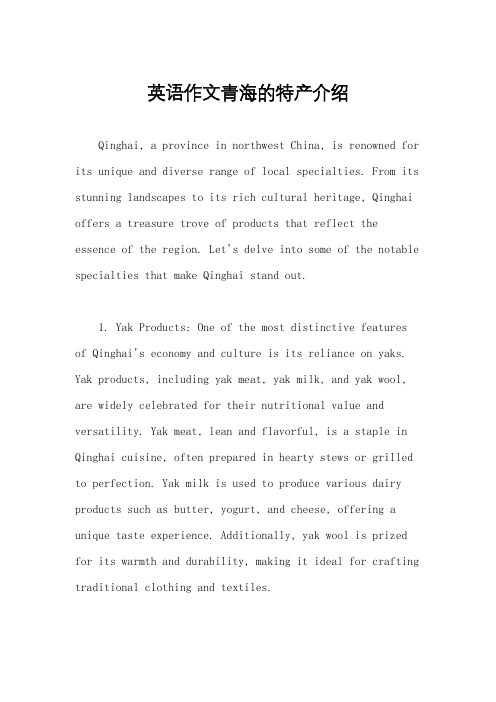
英语作文青海的特产介绍Qinghai, a province in northwest China, is renowned for its unique and diverse range of local specialties. From its stunning landscapes to its rich cultural heritage, Qinghai offers a treasure trove of products that reflect the essence of the region. Let's delve into some of the notable specialties that make Qinghai stand out.1. Yak Products: One of the most distinctive features of Qinghai's economy and culture is its reliance on yaks. Yak products, including yak meat, yak milk, and yak wool, are widely celebrated for their nutritional value and versatility. Yak meat, lean and flavorful, is a staple in Qinghai cuisine, often prepared in hearty stews or grilled to perfection. Yak milk is used to produce various dairy products such as butter, yogurt, and cheese, offering a unique taste experience. Additionally, yak wool is prized for its warmth and durability, making it ideal for crafting traditional clothing and textiles.2. Tsampa (Zanba): Tsampa, a staple food in Tibetan culture, holds a special place in Qinghai's culinary landscape. Made from roasted barley flour, tsampa is commonly eaten by mixing it with butter tea or yogurt to form a dough-like consistency. It's not only a source of sustenance but also a symbol of Tibetan identity and hospitality. Visitors to Qinghai often have the opportunity to taste this traditional dish and experience its cultural significance firsthand.3. Thangka Paintings: Thangka, a form of Tibetan Buddhist scroll painting, is a cherished art form in Qinghai. Skilled artisans meticulously create theseintricate paintings, depicting Buddhist deities, historical events, and sacred landscapes. Thangka paintings are not only visually captivating but also carry deep spiritual meanings for the Tibetan people. They serve as objects of devotion, meditation aids, and decorative pieces, embodying the rich spiritual heritage of Qinghai.4. Qinghai Lake Salt: Qinghai Lake, the largest saltwater lake in China, is not only a scenic wonder butalso a source of high-quality salt. Harvested using traditional methods passed down through generations, Qinghai Lake salt is prized for its purity and mineral-rich flavor. It's often used in Qinghai cuisine to enhance the taste of various dishes, from soups to stir-fries. In addition to its culinary uses, Qinghai Lake salt is also valued for its therapeutic properties and is believed to have health benefits.5. Medicinal Herbs: Qinghai's pristine natural environment is home to a diverse array of medicinal herbs, which have been used for centuries in traditional Chinese medicine. From Tibetan medicine to folk remedies, these herbs play a vital role in maintaining health and wellness. Some notable examples include Cordyceps sinensis, known for its purported energy-boosting properties, and Rhodiola rosea, prized for its adaptogenic effects. Visitors interested in traditional medicine can explore Qinghai's markets and pharmacies to discover a wealth of herbal remedies.In conclusion, Qinghai's specialties offer afascinating glimpse into the region's culture, history, and natural resources. From the rugged terrain of the Tibetan plateau to the tranquil shores of Qinghai Lake, each product reflects the unique character of this diverse and vibrant province. Whether you're savoring yak meat in a local restaurant or admiring the intricate details of a Thangka painting, exploring Qinghai's specialties is an enriching experience that celebrates the richness of Chinese culture.。
英语作文介绍家乡青海

青海:高原上的璀璨明珠Nestled in the heart of the Qinghai-Tibet Plateau, Qinghai Province, China, is a hidden gem that offers a unique blend of natural beauty, rich cultural heritage, and vibrant modern development. This landlocked region, knownfor its vast expanse of lakes and mountains, is home to numerous ethnic groups, each preserving their unique traditions and customs.The province is named after its largest lake, Lake Qinghai, which is also known as the "Jewel of the West". This saltwater lake, the largest in China, is a spectacular sight, with its azure waters reflecting the surrounding snow-capped mountains. The lake's beauty is further enhanced by the migratory birds that flock to its shores each year, adding a vibrant element to its serene landscape. Despite its remote location, Qinghai has a richcultural history. The region is home to multiple ethnic groups, including the Tibetan, Mongolian, Hui, and Han people. Each ethnic group has contributed to the province's rich cultural tapestry, with their unique languages, customs, and traditions. The annual festivals andcelebrations are a testament to this cultural diversity, as people from different ethnic backgrounds come together to share their traditions and stories.Despite its rich cultural heritage, Qinghai is also a rapidly developing province. In recent years, the government has focused on economic development,infrastructure construction, and environmental protection. This focus has led to significant improvements in the province's economic indicators, with increasing investments in renewable energy, tourism, and agriculture.Qinghai's tourism industry has emerged as a key driverof economic growth. The province's unique natural landscapes, including the snow-capped mountains, vast lakes, and lush grasslands, attract thousands of visitors from around the world. The local government has capitalized on this potential by developing a range of tourism productsand services, including eco-tourism, cultural tourism, and adventure tourism.In addition to its natural beauty, Qinghai is also known for its rich biodiversity. The province is home to numerous endangered species, including the Tibetan antelope,snow leopard, and black-necked crane. The government and local conservation organizations are working tirelessly to protect these species and their habitats, ensuring that future generations can enjoy the province's natural wonders. Moreover, Qinghai's education and healthcare systems have also seen significant improvements. The government has invested heavily in upgrading schools, hospitals, and other public facilities, providing better educational and healthcare services to the province's residents.In conclusion, Qinghai Province is a unique and fascinating destination that offers a perfect blend of natural beauty, rich cultural heritage, and vibrant modern development. Its people, proud of their heritage and eagerto share their stories, welcome visitors from around the world to experience the province's wonders. As Qinghai continues to grow and develop, it remains a beacon of hope and inspiration for people from all corners of the globe.**青海:高原明珠的璀璨与活力**位于中国青藏高原腹地的青海省,是一颗隐藏在高原上的璀璨明珠。
英语作文介绍家乡青海
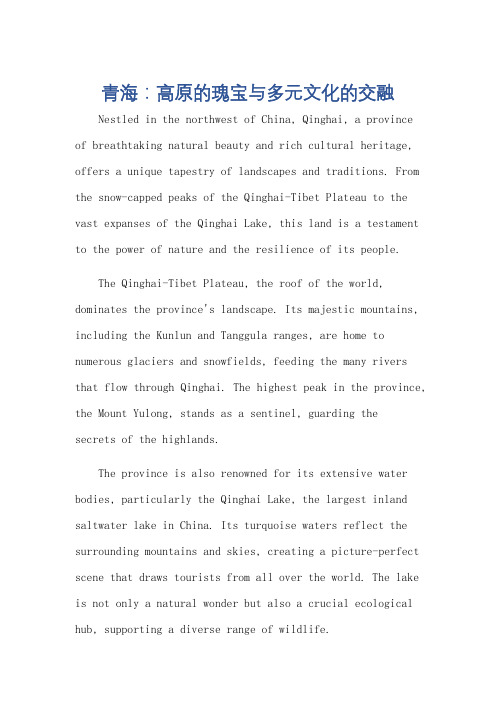
青海:高原的瑰宝与多元文化的交融Nestled in the northwest of China, Qinghai, a provinceof breathtaking natural beauty and rich cultural heritage, offers a unique tapestry of landscapes and traditions. From the snow-capped peaks of the Qinghai-Tibet Plateau to the vast expanses of the Qinghai Lake, this land is a testament to the power of nature and the resilience of its people.The Qinghai-Tibet Plateau, the roof of the world, dominates the province's landscape. Its majestic mountains, including the Kunlun and Tanggula ranges, are home to numerous glaciers and snowfields, feeding the many rivers that flow through Qinghai. The highest peak in the province, the Mount Yulong, stands as a sentinel, guarding thesecrets of the highlands.The province is also renowned for its extensive water bodies, particularly the Qinghai Lake, the largest inland saltwater lake in China. Its turquoise waters reflect the surrounding mountains and skies, creating a picture-perfect scene that draws tourists from all over the world. The lake is not only a natural wonder but also a crucial ecological hub, supporting a diverse range of wildlife.Despite its remote location, Qinghai has a richcultural history that dates back thousands of years. The province is home to multiple ethnic groups, including the Tibetan, Mongolian, Hui, and Han communities, each withtheir unique traditions and customs. These cultures blend harmoniously, creating a vibrant and colorful social fabric. The Tibetan culture, in particular, plays a prominent role in Qinghai's identity. The province is home to many Tibetan monasteries and temples, which are not only centers of spirituality but also repositories of art and history. The intricate wall paintings, carvings, and sculpturesfound in these monasteries are testament to the profound religious and artistic traditions of the Tibetan people.The province's cuisine is also a testament to its cultural diversity. Dishes like the lamb kebab, yogurt, and tsampa, a type of porridge made from barley flour, are staples of the local diet. These dishes, along with the various festivals and celebrations unique to each ethnic group, provide a window into the rich tapestry of Qinghai's cultural life.In recent years, Qinghai has also emerged as a popular destination for adventure tourism. Activities like hiking, trekking, and wildlife observation have gained popularity among travelers seeking a more authentic and immersive experience of the province's natural wonders.As one of China's least developed regions, Qinghai has much to offer in terms of its natural resources andcultural heritage. The province's commitment to sustainable development and tourism has ensured that its beauty and culture are preserved for future generations to enjoy.In conclusion, Qinghai is a province that offers a unique blend of natural beauty and cultural diversity. Its landscapes, traditions, and people are a testament to the resilience and spirit of this remarkable land. As China continues to develop and modernize, Qinghai remains a cherished gem, a reminder of the country's rich history and diverse cultural heritage.**青海:高原瑰宝与多元文化的交融**位于中国西北部的青海,是一个拥有令人叹为观止的自然美景和丰富文化遗产的省份。
介绍青海的英语作文
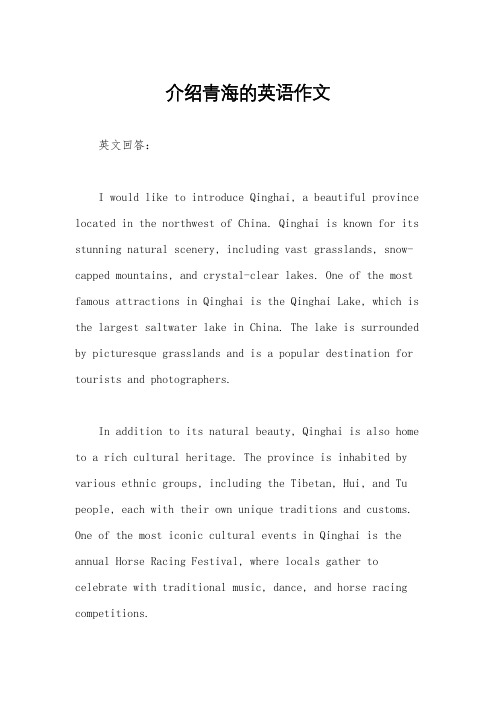
介绍青海的英语作文英文回答:I would like to introduce Qinghai, a beautiful province located in the northwest of China. Qinghai is known for its stunning natural scenery, including vast grasslands, snow-capped mountains, and crystal-clear lakes. One of the most famous attractions in Qinghai is the Qinghai Lake, which is the largest saltwater lake in China. The lake is surrounded by picturesque grasslands and is a popular destination for tourists and photographers.In addition to its natural beauty, Qinghai is also home to a rich cultural heritage. The province is inhabited by various ethnic groups, including the Tibetan, Hui, and Tu people, each with their own unique traditions and customs. One of the most iconic cultural events in Qinghai is the annual Horse Racing Festival, where locals gather to celebrate with traditional music, dance, and horse racing competitions.Furthermore, Qinghai is also known for its delicious cuisine, with a focus on hearty and flavorful dishes. Oneof the most popular local dishes is "hand-pulled noodles," which are made by skillfully pulling and stretching the dough by hand. These noodles are often served with savory beef or lamb broth, creating a satisfying and comforting meal.Overall, Qinghai is a province that offers a perfect blend of natural beauty, rich culture, and delicious food.It is a place where visitors can immerse themselves in the stunning landscapes, experience diverse cultural traditions, and indulge in mouthwatering local delicacies.中文回答:我想介绍一下青海,这是中国西北部一个美丽的省份。
介绍家乡青海的英语初一作文

My Hometown QinghaiNestled in the western reaches of China, Qinghai is a province that holds a special place in my heart. It's aland of breathtaking natural beauty, rich cultural heritage, and warm-hearted people.The first thing that strikes you about Qinghai is its stunning scenery. The vast Qinghai Lake, the largest inland saltwater lake in China, glistens in the sun, its blue waters reflecting the sky above. The surrounding mountains, covered in snow year-round, add to the magnificent landscape. In the summer, the meadows are filled withflowers of every hue, attracting hordes of tourists and nature lovers.What's more, Qinghai is also a cultural melting pot.The Tibetan culture, which is deeply rooted in this land,is evident in every aspect of life here. From the intricate Tibetan thangka paintings to the vibrant festivals like the Snow Donghua Festival, Qinghai offers a glimpse into therich and diverse traditions of its people.The food in Qinghai is also a treat for the senses. The lamb, which grazes on the grassy meadows, is renowned for its tenderness and flavor. Other local delicacies like yak butter tea and highland barley wine are unique to this region and are a must-try for any visitor.But what truly makes Qinghai special is its people. They are warm, friendly, and hospitable, always ready to welcome guests with open arms. Their simple yet fulfilling lifestyle, coupled with their deep-seated respect for nature and tradition, makes Qinghai a truly enchanting place.As I grow older, I cherish the memories of my childhood in Qinghai more and more. The scenic views, the cultural experiences, and the warmth of the people have all left a lasting impression on me. Qinghai is not just my hometown; it's a part of my identity, a piece of my heart that I carry with me wherever I go.**我的家乡青海**青海,位于中国西部,是我心中一个特别的地方。
介绍青海的英语作文80词左右小学生
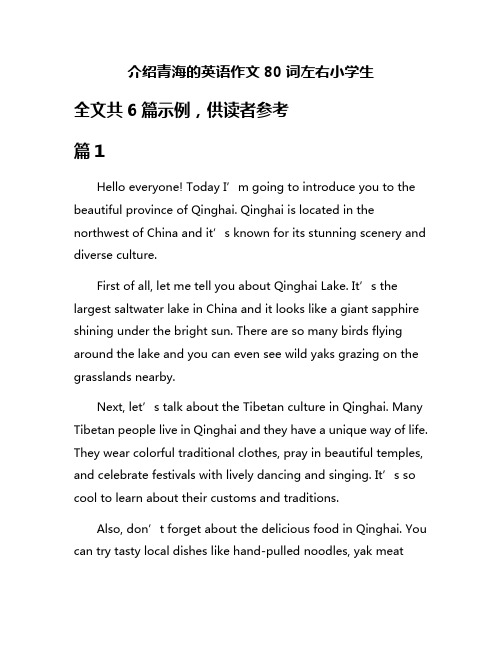
介绍青海的英语作文80词左右小学生全文共6篇示例,供读者参考篇1Hello everyone! Today I’m going to introduce you to the beautiful province of Qinghai. Qinghai is located in the northwest of China and it’s known for its stunning scenery and diverse culture.First of all, let me tell you about Qinghai Lake. It’s the largest saltwater lake in China and it looks like a giant sapphire shining under the bright sun. There are so many birds flying around the lake and you can even see wild yaks grazing on the grasslands nearby.Next, let’s talk about the Tibetan culture in Qinghai. Many Tibetan people live in Qinghai and they have a unique way of life. They wear colorful traditional clothes, pray in beautiful temples, and celebrate festivals with lively dancin g and singing. It’s so cool to learn about their customs and traditions.Also, don’t forget about the delicious food in Qinghai. You can try tasty local dishes like hand-pulled noodles, yak meatdumplings, and butter tea. The flavors are so rich and the ingredients are so fresh, you’ll want to eat everything in sight!In conclusion, Qinghai is a magical place full of natural beauty, rich culture, and mouth-watering food. I hope you can visit someday and experience the wonders of this amazing province. Thank you for listening!篇2Title: Let's Explore Qinghai!Hi everyone! Today I want to introduce you to the beautiful province of Qinghai. Qinghai is located in the northwest part of China and it is known for its stunning natural scenery and rich culture.First of all, Qinghai is home to the famous Qinghai Lake, which is the largest saltwater lake in China. The lake is surrounded by mountains and grasslands, making it a popular destination for tourists. You can take a boat ride on the lake, go fishing, or simply enjoy the breathtaking views.In addition to Qinghai Lake, Qinghai is also known for its diverse ethnic groups. The province is home to many different minority groups, such as the Tibetan and Hui people. You canvisit their villages, try their traditional food, and learn about their unique customs and traditions.Another must-see attraction in Qinghai is the Kumbum Monastery. This ancient Tibetan Buddhist monastery is located in the city of Xining and it is one of the most important religious sites in the region. You can explore the monastery, see the beautiful architecture, and learn about Tibetan Buddhism.Overall, Qinghai is a fantastic place to visit if you want to experience the beauty of nature and learn about different cultures. So, if you ever get the chance, make sure to visit Qinghai and explore all that this amazing province has to offer!篇3Hello everyone! Today I want to introduce you to a very special place in China called Qinghai. It is a beautiful province with lots of amazing things to see and do.First of all, let me tell you about the stunning natural scenery in Qinghai. There are snow-capped mountains, crystal-clear lakes, and vast grasslands. One of the most famous attractions is Qinghai Lake, the largest saltwater lake in China. You can take a boat ride on the lake, or just sit on the shore and enjoy the breathtaking views.In Qinghai, you can also see many Tibetan temples and monasteries. The province has a rich Tibetan culture, and you can learn all about it by visiting these sacred sites. You can see colorful prayer flags fluttering in the wind, and listen to monks chanting their prayers.Another fun thing to do in Qinghai is to try the local food. The province is known for its delicious yak meat dishes, as well as its highland barley wine. You can also try butter tea, a traditional Tibetan drink that is both tasty and warming.Overall, Qinghai is a magical place that is definitely worth a visit. I hope you get the chance to explore this fantastic province someday!篇4Hello everyone, I'm a primary school student and today I want to introduce you all to Qinghai province. Qinghai is located in the northwest of China and it's a really cool place to visit!First of all, Qinghai is known for its beautiful natural scenery. There are lots of mountains, lakes, and grasslands to explore. One of the most famous attractions in Qinghai is the Qinghai Lake, which is the largest saltwater lake in China. It's so big that you can even see it from space!Another cool thing about Qinghai is the Tibetan culture. Many Tibetans live in Qinghai and you can see their traditional costumes, taste their delicious food, and even learn some Tibetan language. The Tibetan monks also have their own unique customs and rituals that are really interesting to watch.In Qinghai, you can also see lots of yaks roaming around. Yaks are a type of animal that live in the high mountains and have long fur to keep them warm. They are super cute and friendly, so make sure to take some pictures with them when you visit!Overall, Qinghai is a fantastic place to visit if you love nature, culture, and adventure. I hope you all get a chance to visit Qinghai someday and experience all the amazing things it has to offer. Thank you for listening to my presentation!篇5Oh, hi everyone! Today, let me introduce you to the amazing place called Qinghai. Qinghai is a province in China, and it's super cool!First of all, Qinghai is famous for its beautiful scenery. There are stunning mountains, crystal clear lakes, and vast grasslands.You can see yaks grazing in the fields, and colorful prayer flags fluttering in the wind. It's like a picture straight out of a fairy tale!Secondly, the people in Qinghai are really friendly and hospitable. They will welcome you with open arms and treat you like family. They love to share their culture and traditions with visitors, so you will learn a lot about their way of life.Another awesome thing about Qinghai is the delicious food. You can try yummy dishes like lamb skewers, hand-pulled noodles, and butter tea. The flavors are so rich and unique, you won't be able to stop eating!Lastly, Qinghai is full of exciting activities for you to enjoy. You can go horseback riding in the grasslands, trekking in the mountains, or even paragliding over the lakes. There is never a dull moment in Qinghai!So, if you ever get the chance, make sure to visit Qinghai. It's a magical place that will capture your heart and leave you wanting more. Trust me, you won't regret it!篇6Hello everyone, I'm a primary school student and I want to introduce you to the beautiful place called Qinghai. Qinghai is aprovince in China and it is located in the northwest part of the country. It is known for its stunning landscapes, clear blue skies, and diverse cultures.One of the most famous attractions in Qinghai is the Qinghai Lake. It is the largest saltwater lake in China and it is surrounded by snow-capped mountains, grasslands, and sand dunes. The lake is a popular destination for tourists who want to relax and enjoy the peaceful environment.Another must-see place in Qinghai is the Kumbum Monastery. It is one of the most important Tibetan Buddhist monasteries in China and it is known for its beautiful architecture and colorful prayer flags. Visitors can learn about the Tibetan culture and religion while exploring this ancient monastery.In addition to its natural beauty and cultural heritage, Qinghai is also home to a diverse group of people. The province is home to various ethnic groups such as Tibetans, Hui, Mongols, and Han Chinese. Each group has its own unique traditions, customs, and festivals, making Qinghai a melting pot of different cultures.Overall, Qinghai is a magical place with so much to offer. Whether you are interested in nature, culture, or history, there is something for everyone to enjoy in this breathtaking province. Ihope you can visit Qinghai one day and experience its beauty for yourself. Thank you for listening to my introduction!。
英语作文介绍青海小吃特产
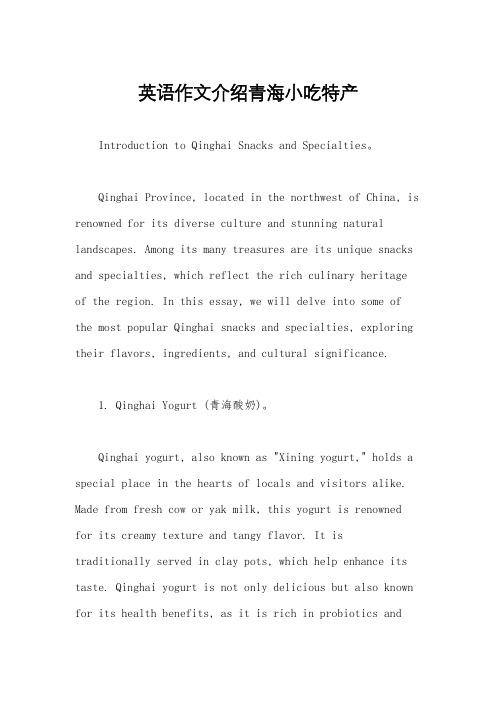
英语作文介绍青海小吃特产Introduction to Qinghai Snacks and Specialties。
Qinghai Province, located in the northwest of China, is renowned for its diverse culture and stunning natural landscapes. Among its many treasures are its unique snacks and specialties, which reflect the rich culinary heritage of the region. In this essay, we will delve into some of the most popular Qinghai snacks and specialties, exploring their flavors, ingredients, and cultural significance.1. Qinghai Yogurt (青海酸奶)。
Qinghai yogurt, also known as "Xining yogurt," holds a special place in the hearts of locals and visitors alike. Made from fresh cow or yak milk, this yogurt is renownedfor its creamy texture and tangy flavor. It istraditionally served in clay pots, which help enhance its taste. Qinghai yogurt is not only delicious but also known for its health benefits, as it is rich in probiotics andnutrients.2. Qinghai Highland Barley Wine (青海高原青稞酒)。
英语作文介绍青海

英语作文介绍青海Qinghai is an amazing province in China, known for its stunning natural landscapes and rich cultural heritage.It's a place where you can experience the vastness of the Tibetan Plateau and the beauty of high-altitude lakes.One of the most remarkable features of Qinghai is its incredible scenery. The province is home to some of the most beautiful lakes in China, like Qinghai Lake, the largest inland saltwater lake in China. The lake's crystal-clear waters reflect the surrounding snow-capped mountains, creating a breathtaking scene that's worth seeing.Besides its natural beauty, Qinghai is also a treasure trove of cultural experiences. Here, you can immerse yourself in Tibetan culture, visiting monasteries and temples, and learning about the local customs and traditions. The people of Qinghai are warm and welcoming, and they're always ready to share their stories and way of life with visitors.Another highlight of Qinghai is its delicious cuisine. Here, you can try authentic Tibetan dishes like momos, thukpas, and butter tea. The food here is hearty and flavorful, and it's a great way to experience the local culture through your taste buds.Overall, Qinghai is a place that offers something for everyone. Whether you're a nature lover, a culture seeker, or a foodie, you'll find something to enjoy in this incredible province. So why not pack your bags and head to Qinghai for an unforgettable adventure?。
英语作文介绍青海小吃特色
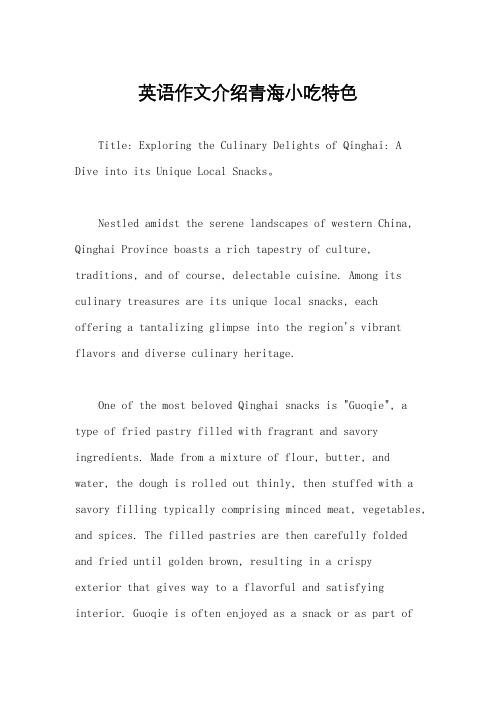
英语作文介绍青海小吃特色Title: Exploring the Culinary Delights of Qinghai: A Dive into its Unique Local Snacks。
Nestled amidst the serene landscapes of western China, Qinghai Province boasts a rich tapestry of culture, traditions, and of course, delectable cuisine. Among its culinary treasures are its unique local snacks, eachoffering a tantalizing glimpse into the region's vibrant flavors and diverse culinary heritage.One of the most beloved Qinghai snacks is "Guoqie", a type of fried pastry filled with fragrant and savory ingredients. Made from a mixture of flour, butter, and water, the dough is rolled out thinly, then stuffed with a savory filling typically comprising minced meat, vegetables, and spices. The filled pastries are then carefully folded and fried until golden brown, resulting in a crispyexterior that gives way to a flavorful and satisfying interior. Guoqie is often enjoyed as a snack or as part ofa hearty meal, providing a delightful burst of flavor with each bite.Another iconic Qinghai snack is "Yak Yogurt", a creamy and nutritious treat that has been enjoyed by locals for generations. Made from the milk of yaks, which are nativeto the Qinghai-Tibet Plateau, this yogurt is known for its rich texture and slightly tangy flavor. Unlike traditional cow's milk yogurt, yak yogurt boasts a higher fat content, giving it a luxurious creaminess that is simplyirresistible. Often served chilled and topped with adrizzle of honey or a sprinkle of nuts, yak yogurt is a refreshing indulgence that perfectly complements Qinghai's brisk climate.For those with a sweet tooth, "Tibetan Butter Tea" is a must-try Qinghai delicacy. A traditional beverage enjoyedby Tibetans and other ethnic groups in the region, butter tea is made by churning yak butter and salt into brewed tea, resulting in a rich and nourishing drink that is both warming and invigorating. The unique combination of flavors – the boldness of the tea, the richness of the butter, andthe subtle hint of salt – creates a beverage that is truly distinctive and unforgettable. Whether sipped slowly on a chilly day or enjoyed as part of a festive celebration, Tibetan Butter Tea is a beloved symbol of hospitality and warmth in Qinghai.In addition to these traditional snacks, Qinghai also offers a wealth of street food delights that cater to a variety of tastes and preferences. From steaming bowls of "Liangfen" (cold noodles) to skewers of grilled lamb seasoned with cumin and chili, the streets of Qinghai are alive with the aromas of spices and herbs, beckoning locals and travelers alike to indulge in a culinary adventure like no other.In conclusion, the snacks of Qinghai Province are a testament to the region's rich cultural heritage and culinary diversity. From savory pastries to creamy yogurts and hearty beverages, each delicacy offers a unique glimpse into the flavors and traditions of this enchanting corner of China. Whether enjoyed on the bustling streets of Xining or savored amidst the breathtaking beauty of the Qinghai-Tibet Plateau, Qinghai snacks are sure to delight the senses and leave a lasting impression on all who partake in their deliciousness.。
青海的美食英文介绍作文
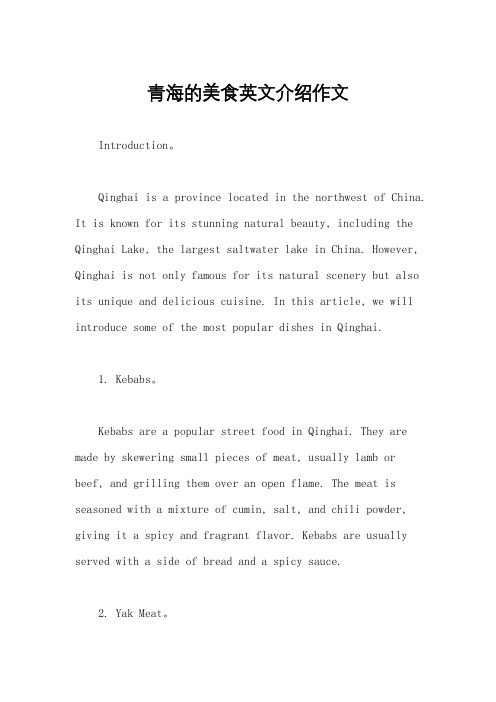
青海的美食英文介绍作文Introduction。
Qinghai is a province located in the northwest of China. It is known for its stunning natural beauty, including the Qinghai Lake, the largest saltwater lake in China. However, Qinghai is not only famous for its natural scenery but also its unique and delicious cuisine. In this article, we will introduce some of the most popular dishes in Qinghai.1. Kebabs。
Kebabs are a popular street food in Qinghai. They are made by skewering small pieces of meat, usually lamb or beef, and grilling them over an open flame. The meat is seasoned with a mixture of cumin, salt, and chili powder, giving it a spicy and fragrant flavor. Kebabs are usually served with a side of bread and a spicy sauce.2. Yak Meat。
Yak meat is a staple food in Qinghai. It is a lean meat that is high in protein and low in fat. Yak meat can be cooked in a variety of ways, including stir-frying, grilling, and boiling. One of the most popular dishes made from yak meat is the Yak Meat Hotpot. The hotpot is a dish that consists of a pot of boiling broth, into which diners place slices of raw meat and vegetables to cook. The broth is flavored with a mixture of spices and herbs, giving it a rich and savory flavor.3. Tsampa。
英语作文介绍青海小吃特产

英语作文介绍青海小吃特产英文:When it comes to Qinghai cuisine, there are many delicious and unique snacks and specialties that you won't find anywhere else. As a local resident, I'd love to introduce some of my favorite Qinghai snacks and specialties.Firstly, let's talk about "Yak Meat". As we all know, Qinghai is home to many yaks, and their meat is a staple in the local cuisine. Yak meat is lean and tender, with a rich flavor that is both savory and slightly sweet. It can be cooked in many ways, such as stir-fried, roasted, or made into dumplings or noodles. One of the most popular dishesis "Yak Meat Soup", which is a hearty and warming soup that is perfect for cold winter days.Another must-try snack is "Qinghai Yogurt". This yogurt is made from fresh yak milk and has a thick and creamytexture, with a slightly sour taste. It is often served with sugar or honey, and is a great snack for hot summer days. The yogurt is also believed to have many health benefits, such as improving digestion and boosting the immune system.Lastly, I want to mention "Tibetan Butter Tea". This is a traditional drink that is popular in Qinghai and other Tibetan regions. It is made from tea leaves, yak butter, and salt, and has a unique flavor that is both salty and creamy. It is often served in small bowls and is a great way to warm up on cold days.Overall, Qinghai cuisine is full of delicious and unique snacks and specialties that are worth trying. From yak meat to yogurt to butter tea, there is something for everyone to enjoy.中文:说起青海美食,有很多美味而独特的小吃和特产,你在其他地方是找不到的。
介绍青海的美食风景景点用英语写作文
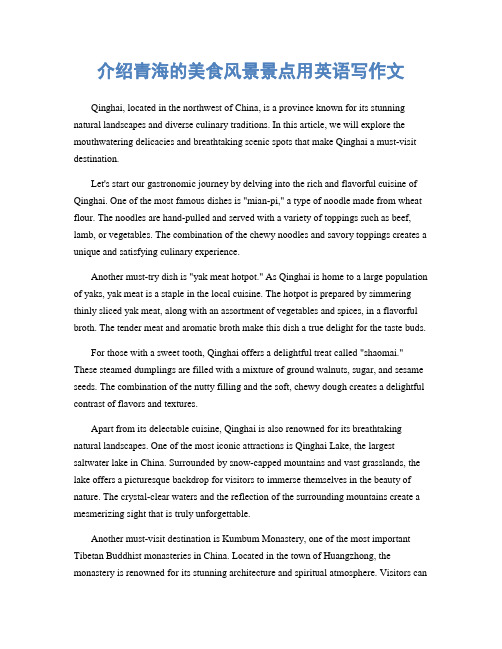
介绍青海的美食风景景点用英语写作文Qinghai, located in the northwest of China, is a province known for its stunning natural landscapes and diverse culinary traditions. In this article, we will explore the mouthwatering delicacies and breathtaking scenic spots that make Qinghai a must-visit destination.Let's start our gastronomic journey by delving into the rich and flavorful cuisine of Qinghai. One of the most famous dishes is "mian-pi," a type of noodle made from wheat flour. The noodles are hand-pulled and served with a variety of toppings such as beef, lamb, or vegetables. The combination of the chewy noodles and savory toppings creates a unique and satisfying culinary experience.Another must-try dish is "yak meat hotpot." As Qinghai is home to a large population of yaks, yak meat is a staple in the local cuisine. The hotpot is prepared by simmering thinly sliced yak meat, along with an assortment of vegetables and spices, in a flavorful broth. The tender meat and aromatic broth make this dish a true delight for the taste buds.For those with a sweet tooth, Qinghai offers a delightful treat called "shaomai." These steamed dumplings are filled with a mixture of ground walnuts, sugar, and sesame seeds. The combination of the nutty filling and the soft, chewy dough creates a delightful contrast of flavors and textures.Apart from its delectable cuisine, Qinghai is also renowned for its breathtaking natural landscapes. One of the most iconic attractions is Qinghai Lake, the largest saltwater lake in China. Surrounded by snow-capped mountains and vast grasslands, the lake offers a picturesque backdrop for visitors to immerse themselves in the beauty of nature. The crystal-clear waters and the reflection of the surrounding mountains create a mesmerizing sight that is truly unforgettable.Another must-visit destination is Kumbum Monastery, one of the most important Tibetan Buddhist monasteries in China. Located in the town of Huangzhong, the monastery is renowned for its stunning architecture and spiritual atmosphere. Visitors canexplore the intricate murals and sculptures that adorn the monastery, as well as witness the daily rituals and ceremonies performed by the monks.For nature enthusiasts, a visit to the Qinghai-Tibet Plateau is a must. Known as the "Roof of the World," this vast plateau offers breathtaking views of snow-capped mountains, deep valleys, and pristine lakes. The unique ecosystem of the plateau is home to a wide variety of flora and fauna, including rare species such as the Tibetan antelope and the snow leopard. Exploring the plateau's diverse landscapes and observing its unique wildlife is a truly awe-inspiring experience.In conclusion, Qinghai is a province that captivates both the palate and the senses. Its delectable cuisine, ranging from hand-pulled noodles to yak meat hotpot, offers a tantalizing taste of the local culture. Meanwhile, its stunning natural landscapes, including Qinghai Lake and the Qinghai-Tibet Plateau, provide a feast for the eyes and a sanctuary for the soul. Whether you are a food lover or a nature enthusiast, Qinghai has something to offer for everyone. So pack your bags and embark on an unforgettable journey to this hidden gem in China.。
关于青海特产的英语作文
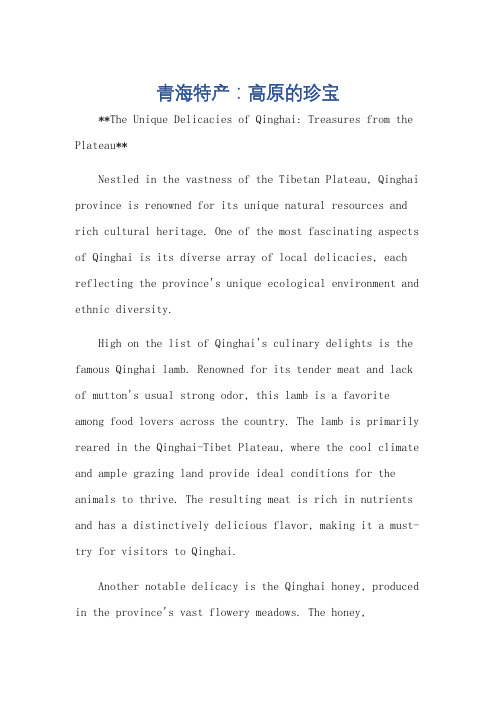
青海特产:高原的珍宝**The Unique Delicacies of Qinghai: Treasures from the Plateau**Nestled in the vastness of the Tibetan Plateau, Qinghai province is renowned for its unique natural resources and rich cultural heritage. One of the most fascinating aspects of Qinghai is its diverse array of local delicacies, each reflecting the province's unique ecological environment and ethnic diversity.High on the list of Qinghai's culinary delights is the famous Qinghai lamb. Renowned for its tender meat and lack of mutton's usual strong odor, this lamb is a favorite among food lovers across the country. The lamb is primarily reared in the Qinghai-Tibet Plateau, where the cool climate and ample grazing land provide ideal conditions for the animals to thrive. The resulting meat is rich in nutrients and has a distinctively delicious flavor, making it a must-try for visitors to Qinghai.Another notable delicacy is the Qinghai honey, produced in the province's vast flowery meadows. The honey,collected from a variety of wildflowers, boasts a unique and rich aroma, with a taste that is both sweet andslightly herbal. It is often used as an ingredient in various desserts and beverages, adding a distinctive flavor to dishes.Qinghai is also famous for its high-quality tea, particularly the Quhai tea, which is grown in theprovince's high-altitude regions. This tea, with its unique aroma and taste, is highly prized by tea lovers for its refreshing and soothing qualities. Many believe that drinking Quhai tea can help alleviate altitude sickness, a common ailment for those visiting the plateau.In addition to these, Qinghai also boasts a range of other delicious delicacies, such as the delectable Qinghai noodles, made from a special type of wheat grown in the province, and the unique Qinghai pickled cabbage, which is prepared using traditional methods and boasts a distinctive sour-and-salty flavor.The unique delicacies of Qinghai are not just food; they are a cultural experience that offers a taste of the province's rich history and diverse ethnic heritage. Fromthe succulent lamb to the fragrant honey, each delicacy tells a story of Qinghai's unique natural environment and the hard work of its people. Visiting Qinghai is not just a journey to experience its breathtaking natural beauty; it is also a culinary adventure that will tantalize the taste buds and warm the heart.。
介绍青海特色美食的作文英语
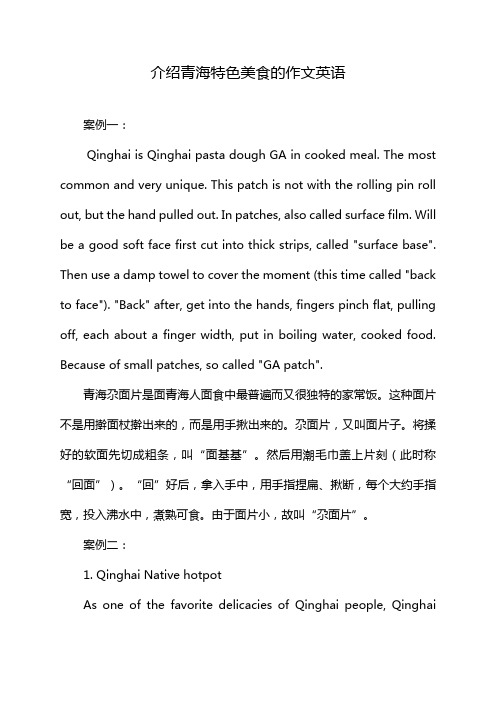
介绍青海特色美食的作文英语案例一:Qinghai is Qinghai pasta dough GA in cooked meal. The most common and very unique. This patch is not with the rolling pin roll out, but the hand pulled out. In patches, also called surface film. Will be a good soft face first cut into thick strips, called "surface base". Then use a damp towel to cover the moment (this time called "back to face"). "Back" after, get into the hands, fingers pinch flat, pulling off, each about a finger width, put in boiling water, cooked food. Because of small patches, so called "GA patch".青海尕面片是面青海人面食中最普遍而又很独特的家常饭。
这种面片不是用擀面杖擀出来的,而是用手揪出来的。
尕面片,又叫面片子。
将揉好的软面先切成粗条,叫“面基基”。
然后用潮毛巾盖上片刻(此时称“回面”)。
“回”好后,拿入手中,用手指捏扁、揪断,每个大约手指宽,投入沸水中,煮熟可食。
由于面片小,故叫“尕面片”。
案例二:1. Qinghai Native hotpotAs one of the favorite delicacies of Qinghai people, QinghaiNative hotpot is well known. There is no reason why people in Qinghai love to eat so much. There are various kinds of ingredients in Qinghai local hot pot, such as fried potatoes, balls, vegetables, and some shop or home-made pickles, which are really delicious and refreshing. The pot used for Qinghai Native hotpot is a copper stove, which is very common in Northwest China and has northwest characteristics. The hotpot cooked in this pot is especially suitable for enjoying in cold winter.2. Lamb tripe in clear soupMaodu in clear soup is a special food in Xining. The uniqueness lies in the production of lamb tripe.The lamb tripe shall be cleaned before cooking in a pot. During the cooking, salt, pepper, garlic and the like shall be added. After cooking, it shall be removed and cut. Then it shall be boiled in a pot with mutton soup for a few minutes. After that, it can be enjoyed by adding a few drops of sesame oil and a little green onion.1、青海土火锅作为青海人最爱吃的美食之一,青海土火锅可谓是家喻户晓了。
英语作文介绍青海小吃特色
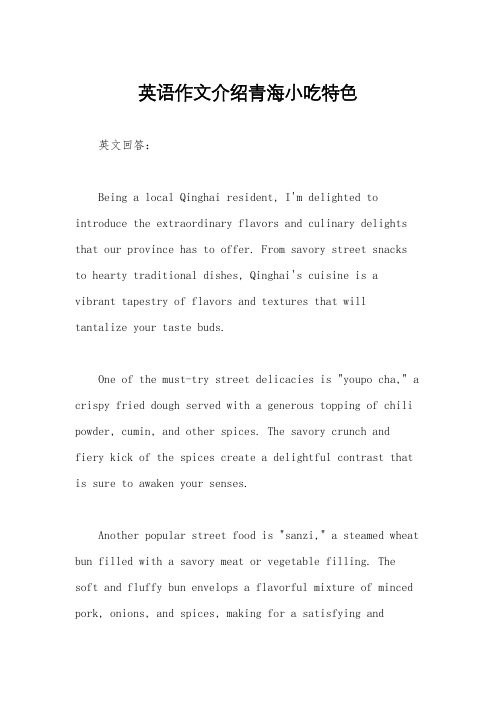
英语作文介绍青海小吃特色英文回答:Being a local Qinghai resident, I'm delighted to introduce the extraordinary flavors and culinary delights that our province has to offer. From savory street snacks to hearty traditional dishes, Qinghai's cuisine is avibrant tapestry of flavors and textures that willtantalize your taste buds.One of the must-try street delicacies is "youpo cha," a crispy fried dough served with a generous topping of chili powder, cumin, and other spices. The savory crunch andfiery kick of the spices create a delightful contrast that is sure to awaken your senses.Another popular street food is "sanzi," a steamed wheat bun filled with a savory meat or vegetable filling. Thesoft and fluffy bun envelops a flavorful mixture of minced pork, onions, and spices, making for a satisfying andportable snack.When it comes to traditional dishes, Qinghai excels in creating hearty and comforting meals. "Lamian," or hand-pulled noodles, is a staple of Qinghai cuisine. The noodles are made fresh by hand and served in a flavorful broth with a variety of toppings, including lamb, vegetables, andchili oil.Another traditional delicacy is "huozhao," a type of steamed bread that is often paired with stews or soups. The bread is made with a mixture of wheat and barley flour, giving it a unique texture and nutty flavor.The culinary journey in Qinghai would not be complete without mentioning the province's famed yak products. Yak meat is considered a delicacy and is often used in dishes such as "yao rou chuan," which are grilled yak skewers. Yak butter is also highly prized and is used in a variety of dishes, including tea and pastries.Qinghai's cuisine is a testament to the province's richcultural heritage. Each dish tells a story of the local people, their traditions, and their enduring love for good food. As a local, I encourage you to embark on a culinary adventure in Qinghai and experience firsthand the vibrant flavors and warm hospitality that our province is known for.中文回答:作为一名青海本地居民,我很荣幸向大家介绍我们青海独具特色的美食文化。
